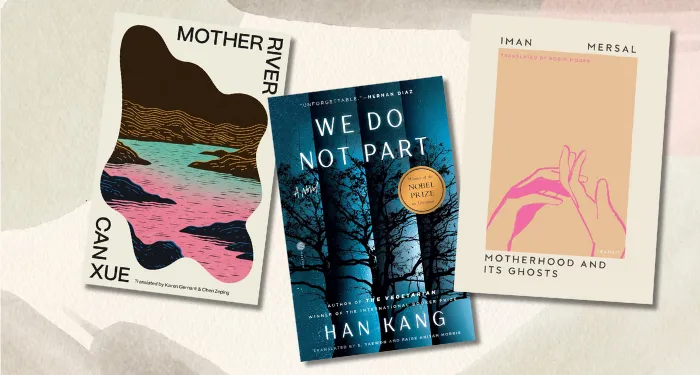
The Most Anticipated Books In Translation of 2025
Last year was an astonishingly good year for literature in translation, and after poring over catalogs and galleys, I’m thrilled to say that it’s only going to continue in 2025. In a year of uncertainty, I’ll take that small silver lining. I’ve highlighted some of the best 2025 new releases in translation, and because there is so much to choose from, I’ve added notes for others you should seek out as well! There’s something for everyone this season, with new novels, thoughtful nonfiction, stunning short story collections, and much more.
Readers will be particularly excited to see new titles from returning favorite authors like Han Kang, Can Xue, Iman Mersal, and Hanne Ørstavik and translators Martin Aitken, e. yaewon, Paige Aniyah Morris, and Maureen Freely, but I’ve included some authors new to English-language audiences as well. It seems like every year, the new titles in translation become more diverse and wide-ranging, especially when it comes to country of origin and language, and it’s a joy — and increasingly a wonderful challenge — to pick from them.
2025 New Releases In Translation
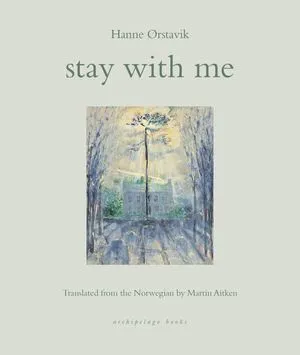
stay with me by Hanne Ørstavik, translated by Martin Aitken
Hanne Ørstavik’s books Love, Ti Amo, and The Pastor have made her one of the most celebrated contemporary Scandinavian writers. She is a master at precision and tension, and her spare writing has always been stunningly captured by her longtime English translator Martin Aitken. In stay with me, Ørstavik’s narrator begins an affair with a younger man after the death of her husband. The younger man’s anger problems remind the narrator of her childhood and the troubled relationship she has with her own father. Fear and vulnerability alter Ørstavik’s prose and this novel’s style is more breathless and urgent. “Writing is a process of accessing a truth that only the writing can realize,” she has said, and the truths she grapples with while writing this novel are raw and profound. stay with me reflects on fear, violence, and love to devastating effect. (Archipelago, April 15)
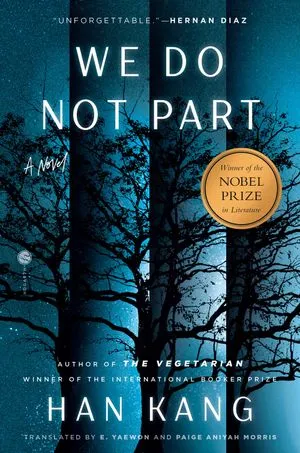
We Do Not Part by Han Kang, translated by e. yaewon and Paige Aniyah Morris
I’ve long adored Han Kang’s sharp and stunning novels, including the Man Booker International Prize winner The Vegetarian, as well as Human Acts and The White Book, all translated by Deborah Smith, and her most recent novel, Greek Lessons, translated by Smith and Emily Yae Won — so I was eagerly anticipating this new book. And then Han Kang was awarded the Nobel Prize in Literature! She is the first Asian woman and first Korean citizen to win the award in literature. In their citation, the Nobel Committee for Literature awarded Han Kang the award “for her intense poetic prose that confronts historical traumas and exposes the fragility of human life.” We Do Not Part fits seamlessly into her body of work as she continues to think about trauma, history, and human connection — this time through a beautifully rendered story of friendship. (Hogarth, January 21)
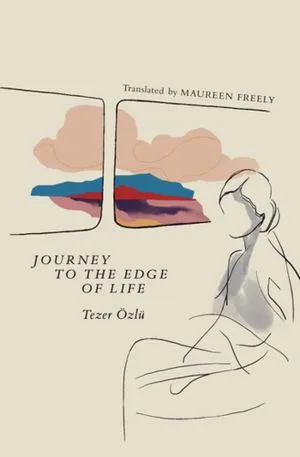
Journey to the Edge of Life by Tezer Özlü, translated by Maureen Freely
When I picked up Tezer Özlü’s first book translated into English by Maureen Freely, Cold Nights of Childhood, I was immediately struck by a line in the author’s bio: “Tezer Özlü claimed her place in Turkish letters by breaking every rule imposed on her.” She is now one of Turkey’s most beloved writers and has inspired a new generation of feminist writers, as is beautifully described in Aysegül Savas’s introduction to that book. In Journey to the Edge of Life, an unnamed writer travels across Europe to visit the final resting places of her literary idols Cesare Pavese, Italo Svevo, Franz Kafka. She reflects on life and art in her own roving way. (Transit Books, April 1)

Covert Joy: Selected Stories by Clarice Lispector, translated by Katrina Dodson
Clarice Lispector is an internationally-acclaimed author widely considered to be Brazil’s greatest modern writer and called the most important Jewish writer since Kafka. She was born in 1920 to a Jewish family in Ukraine, and as a result of anti-Semitic violence, her family fled to Brazil when she was still an infant. At the age of 23, she burst onto the literary scene with the publication of Near to the Wild Heart. She is as much legend as she is fact — dark, dazzling, intense, glamorous, “the sphinx of Rio de Janeiro,” “a female Chekhov on the beaches of Guanabara.” Covert Joy is a selection of her stories from the beloved behemoth that is her Complete Stories, gathered from the nine collections published during her lifetime. The stories, written during her adolescence all the way up until her death, are inventive and haunting, often about interesting and complex women at various stages of their lives. With a new foreword by Rachel Kushner, this selection is the perfect push for anyone who has been hovering on the edge of the abyss. (New Directions, February 11)
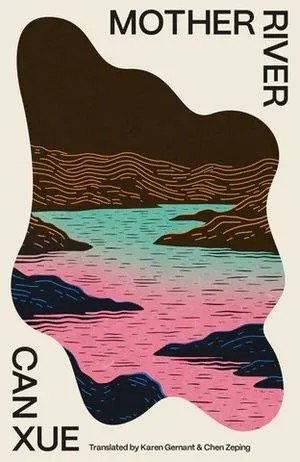
Mother River by Can Xue, translated by Karen Gernant and Chen Zeping
Can Xue is the pseudonym of the award-winning Chinese experimental writer Deng Xiaohua. She is the author of The Last Lover, Vertical Motion, Frontier, and Love in the New Millennium, among many others. She has a cult following and her name is often at the top of the Nobel Prize for Literature betting odds list. Even Susan Sontag has said, “If China has one possibility of a Nobel laureate it is Can Xue.” In Mother River, Xue spins surreal tales of time, nature, and identity. Like its titular river, this collection feels ever-changing and moving with an immense depth that lures you in. (Open Letter, January 21)
And don’t miss Open Letter’s other work out this year, like Berlin by Andris Kuprišs and translated by Ian Gwin, Birthday by Jana Egle and translated by Uldis Balodis, and The River by Laura Vinogradova and translated by Kaija Straumanis, the newest offering in Open Letter’s translator triptych series where a translator presents a curated collection of writers from a specific language. This year’s offering is a collection of authors writing in Latvian, curated by Kaija Straumanis.
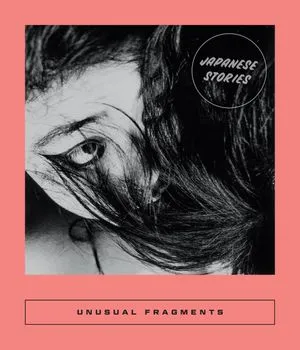
Unusual Fragments: Japanese Stories by Taeko Kono, Nobuko Takagi & Others, translated by Lucy North, Margaret Mitsutani & Others
I’ve loved the Calico series from Two Lines Press since its inception. Ranging from speculative Chinese fiction to Arabic poetry and Latin American horror, among others, each book in the series is built around a theme and captures a thrilling and unique moment in international literature. Series editor Sarah Coolidge’s finger is always on the pulse of some of the most exciting literary movements happening today. Unusual Fragments fits perfectly into the current popularity of Japanese literature and thoughtfully presents five award-winning but relatively unknown Japanese authors from the past century — authors that “inspired the current generation of Japanese writers we’ve all come to love,” as Coolidge writes in her preface. The stories themselves — all previously untranslated and brought into English by a stunning array of some of the best translators working today — are strange and beguiling, fixating often on desire and power and the anxieties of modern life. They are indeed “rare and unusual fragments.” (Two Lines, March 11)
Also from Two Lines, don’t miss Mending Bodies by Hon Lai Chu, translated by Jacqueline Leung (Two Lines, April 8).
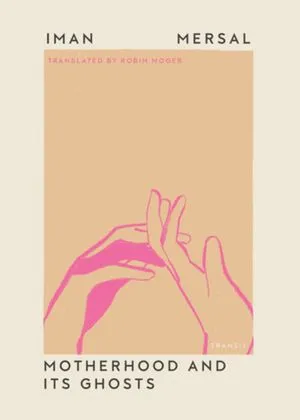
Motherhood and Its Ghosts by Iman Mersal, translated by Robin Moger
Iman Mersal is considered by many to be Egypt’s premier poet, and I’d argue she’s one of the world’s foremost poets. She is also the author of Traces of Enayat, winner of the prestigious Sheikh Zayed Book Award — making Mersal the first woman to win in the literature category. In that remarkable work of creative nonfiction, Mersal retraces the mysterious life and loss of Egyptian writer Enayat al-Zayyat, who took her life in 1963, at the age of 27, four years before the publication of her novel Love and Silence. Motherhood and Its Ghosts comes in the same vein as that fascinating and multilayered project. In her new book, Mersal writes about her own mother, who died giving birth at age 27. Mersal has only one photo of her mother, and years later, when Mersal becomes a mother herself, she begins to think about motherhood itself. She muses on its many representations — the images, dreams, and ghosts of motherhood — using photographs, readings, and her own journal entries. This is a searching, intimate, and captivating volume that deserves a place among the best writing and thinking about motherhood. (Transit Books, May 6)
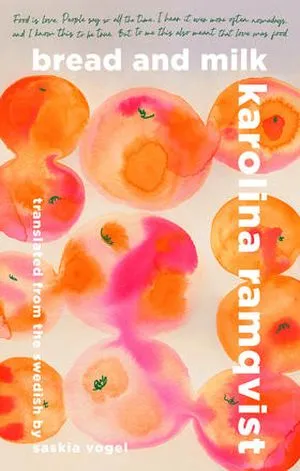
Bread and Milk by Karolina Ramqvist, translated by Saskia Vogel
“Food is love. People say so all the time. I hear it ever more often nowadays, and I know this to be true. But to me this also meant that love was food.” Beloved Swedish author Karolina Ramqvist reflects on her life through memories of food in this striking memoir translated by Saskia Vogel. (I read everything Saskia Vogel touches.) The brightness of a tangerine in the depths of winter. The creamy comfort of rice pudding made by loving hands. Ramqvist reflects on love and family as she pulls forth memories of her girlhood and her mother and grandmother and their — sometimes fraught — relationships to food. There is physical hunger and then there is the hunger for something more; Ramqvist writes viscerally and vulnerably about her own disordered eating amidst loss and wanting. Her story is one that will never leave me. (Coach House, February 11)
As always, you can find a full list of new releases in the magical New Release Index, carefully curated by your favorite Book Riot editors, organized by genre and release date.
And for some incredible new releases in translation you may have missed from last year, check out this list of the Must-Read Spring 2024 New Releases In Translation











